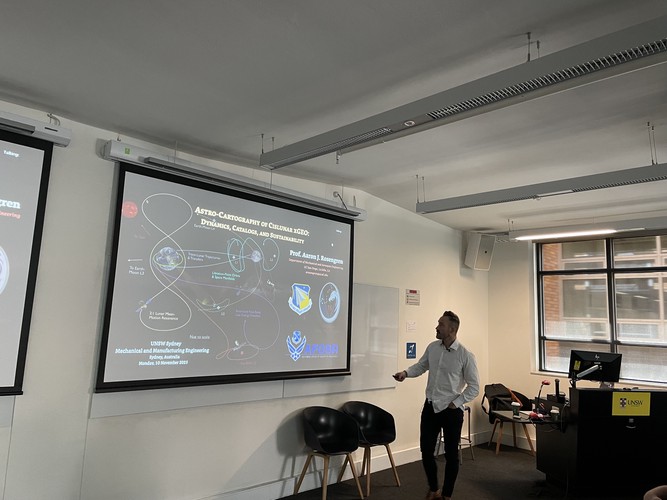We were honored to host Dr Aaron J. Rosengren, Assistant Professor at the University of California San Diego, for a seminar on “Astro-Cartography of Cislunar xGEO: Dynamics, Catalogs, and Sustainability” on November 10, 2025.
Seminar Details
Speaker: Dr Aaron J. Rosengren
Affiliation: The University of California San Diego
Date: 10 November 2025
Time: 10:00 - 11:00 AM
Venue: Room 202, Ainsworth Building J17
Abstract
The cislunar xGEO region, stretching from just beyond geosynchronous orbit to well past the Moon, is rapidly becoming a focal point for science, exploration, commercial activity, and national security. Yet the dynamics that govern this volume are fundamentally different from the weakly perturbed Keplerian orbits that underpin traditional space surveillance.
Dr. Rosengren outlined a multiscale astrodynamical framework for modelling, monitoring, and ultimately enabling sustainable activity in this regime. Using Hamiltonian perturbation theory and restricted multi-body dynamics, the approach maps the web of lunar mean-motion and secular resonances that structure cislunar phase space, quantifies their broadened widths, and identifies both highly stable “graveyard” zones and strongly chaotic transport regions.
Heteroclinic transport networks linking interior and exterior resonances through Earth–Moon libration-point manifolds expose natural ballistic corridors for fuel-free transfers and for the migration of space debris and lunar ejecta. These dynamical structures were illustrated using high-fidelity ephemerides of missions such as TESS, IBEX, and Spektr-R, highlighting their direct operational relevance.
The talk also discussed a Gaussian-mixture “dynamical coherency gate” for recovering consistent long-arc trajectories from sparse tracking data, a curated organization of xGEO and cislunar objects by resonant and secular behavior, and MEGNO-based stability cartographies of the Earth–Moon Hill sphere. Dr. Rosengren emphasized how these multiscale tools can inform future space-domain awareness architectures, sensor-tasking strategies, and responsible end-of-life disposal policies that support the long-term safety and sustainability of this increasingly active cislunar environment.
About the Speaker
Dr Aaron J. Rosengren is an Assistant Professor in the Jacobs School of Engineering at the University of California San Diego. He previously served from 2017-2020 as an Assistant Professor in the College of Engineering and of the Interdisciplinary Graduate Program in Applied Mathematics at the University of Arizona.
He completed his postdocs at the Aristotle University of Thessaloniki in Greece in the Department of Physics (2016-2017), as a member of the EU H2020 Project, REDSHIFT, and at the Institute of Applied Physics Nello Carrara of the Italian National Research Council (2014-2016), as a Marie Curie Fellow in the FP7 Stardust Network.
He has held visiting researcher positions at UNSW Canberra in Australia, the Asher Space Research Institute at Technion in Israel, the University of Rome Tor Vergata in Italy, and the Belgrade Astronomical Observatory in Serbia. Dr. Rosengren is Fellow of the Outer Space Institute (OSI) for the sustainable development of space at the University of British Columbia and currently serves on the External Advisory Board of the Ann and H.J. Smead Department of Aerospace Engineering Sciences at the University of Colorado Boulder.
This seminar highlighted cutting-edge research in cislunar space domain awareness and sustainable space operations, areas of strong relevance to our research group’s work in space navigation and tracking.
